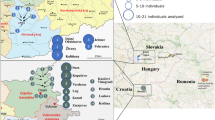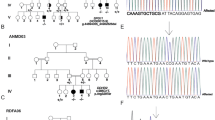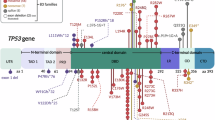Abstract
We performed haplotype analysis using nine single nucleotide polymorphisms in the ornithine transcarbamylase gene to explore the ancestral origins of three mutations associated with late-onset phenotype in male patients: p.R40H, p.R277W and p.Y55D. Overall, 8 haplotypes were defined among 14 families carrying p.R40H, 5 families carrying p.R277W and 2 families with p.Y55D mutations. Of nine Japanese families carrying p.R40H, eight exhibited haplotype (HT)1, whereas the other family harbored HT2. Among three Caucasian families, one Spanish and one Australian family bore HT3; one Austrian family had HT4. Two US patients harbored HT2 and HT4. Among families carrying p.R277W, HT5 was found in one Japanese, one Korean and one US family. Two other US families had HT2 and HT6. Two families carrying p.Y55D, both Japanese, shared HT1. These results indicate that the p.R40H mutation has arisen recurrently in all populations studied, although there is evidence for a founder effect in Japan, with most cases probably sharing a common origin, and to a lesser extent in subjects of European ancestry (HT3). It is evident that p.R277W mutation has recurred in discrete populations. The p.Y55D mutation appears to have arisen from a common ancestor, because this transversion (c.163T>G) occurs rarely.
Similar content being viewed by others
Log in or create a free account to read this content
Gain free access to this article, as well as selected content from this journal and more on nature.com
or
References
Lindgren, V., de Martinville, B., Horwich, A. L., Rosenberg, L. E. & Francke, U. Human ornithine transcarbamylase locus mapped to band Xp21.1 near the Duchenne muscular dystrophy locus. Science 226, 698–700 (1984).
Horwich, A. L., Fenton, W. A., Williams, K. R., Kalousek, F., Kraus, J. P., Doolittle, R. F. et al. Structure and expression of a complementary DNA for the nuclear coded precursor of human mitochondrial ornithine transcarbamylase. Science 224, 1068–1074 (1984).
Hata, A., Tsuzuki, T., Shimada, K., Takiguchi, M., Mori, M. & Matsuda, I. Structure of the human ornithine transcarbamylase gene. J. Biochem. 103, 302–308 (1988).
Maestri, N. E., Clissold, D. & Bruislow, S. W. Neonatal onset ornithine transcarbamylase deficiency: a retrospective analysis. J. Pediatr. 134, 268–272 (1999).
Finkelstein, J. E., Hauser, E. R., Leonard, C. O. & Brusilow, S. W. Late-onset ornithine transcarbamylase deficiency in male patients. J. Pediatr. 117, 897–902 (1990).
Yoshino, M., Nishiyori, A., Yamashita, F., Abe, H., Tanikawa, K., Ohno, T. et al. Ornithine transcarbamylase deficiency in male adolescence and adulthood. Enzyme 43, 160–168 (1990).
Harada, E., Nishiyori, A., Tokunaga, Y., Watanabe, Y., Kuriya, N., Kumashiro, R. et al. Late-onset ornithine transcarbamylase deficiency in male patients: prognostic factors and characteristics of plasma amino acid profile. Pediatr. Int. 48, 105–111 (2006).
Tuchman, M., Jaleel, N., Morizono, H., Sheehy, L. & Lynch, M. G. Mutations and polymorphisms in the human ornithine transcarbamylase gene. Hum. Mutat. 19, 93–107 (2002).
Yamaguchi, S., Brailey, L. L., Morizono, H., Bale, A. E. & Tuchman, M. Mutations and polymorphisms in the human ornithine transcarbamylase (OTC) gene. Hum. Mutat. 27, 626–632 (2006).
Numata, S., Harada, E., Maeno, Y., Ueki, I., Watanabe, Y., Fujii, C. et al. Paternal transmission and slow elimination of mutant alleles associated with late-onset ornithine transcarbamylase deficiency in male patients. J. Hum. Genet. 53, 10–17 (2008).
Tuchman, M., Morizono, H., Rajagopal, B S., Plante, R J. & Allenwell, N. M. Identification of ‘private’ mutations in patients with ornithine transcarbamylase deficiency. J. Inherit. Metab. Dis. 20, 525–527 (1997).
Tuchman, M., Plante, R. J., García-Pérez, M. A. & Rubio, V. Relative frequency of mutations causing ornithine transcarbamylase deficiency in 78 families. Hum. Genet. 97, 274–276 (1996).
Matsuda, I. & Tanase, S. The ornithine transcarbamylase (OTC) gene: mutations in 50 Japanese families with OTC deficiency. Am. J. Med. Genet. 71, 378–383 (1997).
McCullough, B. A., Yudkoff, M., Batshaw, M. L., Wilson, J. M., Raper, S. E. & Tuchman, M. Genotype spectrum of ornithine transcarbamylase deficiency: correlation with the clinical and biochemical phenotype. Am. J. Med. Genet. 93, 313–319 (2000).
Nishiyori, A., Yoshino, M., Kato, H., Matsuura, T., Hoshide, R., Matsuda, I. et al. The R40H mutation in late onset type of human ornithine transcarbamylase deficiency in male patients. Hum. Genet. 99, 171–176 (1997).
Nishiyori, A., Yoshino, M., Tananari, Y., Matsuura, T., Hoshide, R., Matsuda, I. et al. Y55D Mutation in ornithine transcarbamylase associated with late-onset hyperammonemia in a male. Hum. Mutat. 1 (Suppl), 131–133 (1998).
Plante, R. J. & Tuchman, M. Polymorphisms in the human ornithine transcarbamylase gene useful for allele tracking. Hum. Mutat. 12, 289–290 (1998). Mutation in brief #193 Online.
Azevedo, L., Calafell, F., Vilarinho, L. & Amorim, A. Haplotype analysis and phylogeny of ornithine transcarbamylase polymorphism. Ann. Hum. Genet. 66, 379–385 (2002).
Azevedo, L., Vilarinho, L., Teles, E. L. & Amorim, A. Ornithine transcarbamylase deficiency: a novel splice site mutation in a family with meiotic recombination and a new useful SNP for diagnosis. Mol. Genet. Metab. 76, 68–70 (2002).
Climent, C. & Rubio, V. H Intragenic polymorphisms and haplotype analysis in the ornithine transcarbamylase (OTC) gene and their relevance for tracking the inheritance of OTC deficiency. Hum. Mutat. 20, 407–408 (2002). Mutation in Brief #547 Online.
Azevedo, L., Stolnaja, L., Tietzeova, E., Hrebicek, M., Hruba, E., Vilarinho, L. et al. New polymorphic sites within ornithine transcarbamylase gene: population genetics studies and implications for diagnosis. Mol. Genet. Metab. 78, 152–157 (2003).
Azevedo, L., Climent, C., Vilarinho, L., Calafell, F. & Amorim, A. Evidence for mutational cis-acting factors affecting mutagenesis in the ornithine transcarbamylase gene. Hum. Mutat. 24, 273 (2004). Mutation in Brief #739 Online.
Plöchl, W., Spiss, C. K. & Plöchl, E. Death after transplantation of a liver from a donor with unrecognized ornithine transcarbamylase deficiency. N. Eng. J. Med. 341, 921–922 (1999).
Barrett, J. C., Fry, B., Maller, J. & Daly, M. J. Haploview: analysis and visualization of LD and haplotype maps. Bioinformatics 21, 263–265 (2005) [PubMed ID 15297300].
Matsuda, I., Matsuura, T., Nishiyori, A., Komaki, S., Hoshide, R., Matsumoto, T. et al. Phenotypic variability in male patients carrying the mutant ornithine transcarbamylase (OTC) allele Arg40His, ranging from a child with an unfavourable prognosis to an asymptomatic order adult. J. Med. Genet. 33, 645–648 (1996).
Antonarakis, S. E., Krawczak, M. & Cooper, D. N. The nature and mechanism of human gene mutation. In The Metabolic and Molecular Bases of Inherited Disease (eds. Scriver, C.R., Beaudet, A.L., Sly, W.S., Valle, D.) 8th edn. 343–377 (McGraw-Hill, New York, 2001).
Arranz, J. A., Riudor, E., Marco-Marín, C. & Rubio, V. Estimation of the total number of diseases-causing mutations in ornithine transcarbamylase (OTC) deficiency. Value of the OTC structure in predicting a mutation pathogenic potential. J. Inherit. Metab. Dis. 30, 217–226 (2007).
Pinner, J. R., Freckmann, M.- L., Yoshino, M. & Kirk, E. P. Female heterozygotes for the hypomorphic R40H mutation can have ornithine transcarbamylase deficiency and present in early adolescence: two cases. J. Med. Case Report, submitted.
Kim, G.- H., Choi, J.- H., Lee, H. H., Park, S., Kim, S.- S. & Yoo, H.- W. Identification of novel mutations in the human ornithine transcarbamylase (OTC) gene of Korean patients with OTC deficiency and transient expression of the mutant proteins in vitro. Hum. Mutat. 27, 1159 (2006). Mutation in Brief #936 Online.
Acknowledgements
We thank Professor Ichiro Matsuda of the Health Sciences University of Hokkaido for his encouraging discussion, Professor Walter Plöchl of the Department of Anesthesiology and Intensive care, Medical University of Vienna and Professor Engelbert Plöchl of the St Johannes Hospital Salzburg, for their cooperation in collecting specimens. This work was supported in part by a grant from the Japan Ministry of Education, Culture, Sport, Science and Technology and by a grant from the Research Center for Innovative Cancer Therapy of the 21th Century COE Program for Medical Science, Kurume University.
Author information
Authors and Affiliations
Corresponding author
Rights and permissions
About this article
Cite this article
Numata, S., Koda, Y., Ihara, K. et al. Mutant alleles associated with late-onset ornithine transcarbamylase deficiency in male patients have recurrently arisen and have been retained in some populations. J Hum Genet 55, 18–22 (2010). https://doi.org/10.1038/jhg.2009.113
Received:
Revised:
Accepted:
Published:
Issue date:
DOI: https://doi.org/10.1038/jhg.2009.113
Keywords
This article is cited by
-
Urea cycle disorders in India: clinical course, biochemical and genetic investigations, and prenatal testing
Orphanet Journal of Rare Diseases (2018)
-
Sudden unexpected fatal encephalopathy in adults with OTC gene mutations-Clues for early diagnosis and timely treatment
Orphanet Journal of Rare Diseases (2014)



